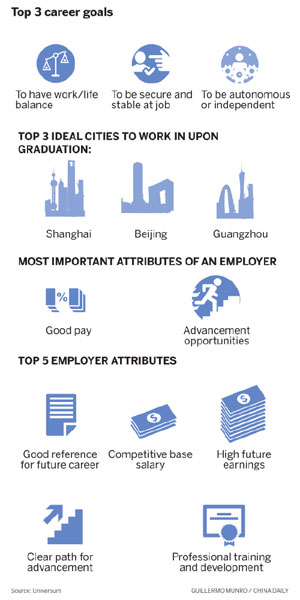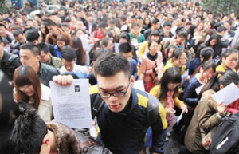By Wang Hongyi in Shanghai (China Daily)
City replaces nation's capital as most attractive destination for employment
Shanghai has eclipsed Beijing as the No 1 place of employment for Chinese universitygraduates, a recent survey concludes.

The report was released by the career consultingcompany Universum earlier this month. It polled morethan 51,000 soon-to-graduate students from 103universities across the country to discover theircareer expectations and preferences and how theyperceive employers.
Beijing, Shanghai and Guangzhou, the best knowneconomic engines for China's development,unsurprisingly remained the top three destinations foraspiring graduates.
But Shanghai replaced Beijing at the top spot.
"Shanghai occupies a pivotal position in China'seconomy, and also has more job opportunities. Thatattracts more talent here," said Wen Jun, director ofthe Institute of Sociology at East China NormalUniversity.
"A series of proactive policies, such as theestablishment of the Free Trade Zone, makes thecity more promising and appealing."
A local university teacher who declined to be namedagreed: "Beijing has long been chosen by graduatesas the top destination for employment because of itsstatus as the capital and its large developmentopportunities. But in recent years, the high living costand bad air have made many graduates give up on it."
Many students are in the same camp. "I prefer to stay in Shanghai and look for a suitable jobhere, though my hometown is closer to Beijing," said a business major from Shanghai Universityof International Business and Economics, who identified herself as Li.
"Compared with Beijing, I think Shanghai is a more open and energetic city. Its relatively effectiveand ordered city management, and its living and working environment attract me a lot," she said.
Experts said the difficulty of getting a Beijing hukou, or permanent residency permit, is anotherbig reason the capital is no longer in first place.
Shanghai has introduced a more flexible policy regarding residency to draw talent. The policywidens the space for individual progress in the city, Wen said.
According to the Universum report, the average expected monthly salary for a university graduateis 6,564 yuan ($1,057), down 2.9 percent from 2013.
The top five attributes of employers, according to students,are good reference for a future career, a competitive basesalary, high future earnings, a clear path for advancementand professional training and development.
Graduates in other countries put more emphasis on anemployer's culture and on interpersonal relationships whileChina's university graduates pay more attention to salary anddevelopment opportunities. As China's economicdevelopment slows, concerns over shrinking jobopportunities have increased among graduating students.They have become more analytical about their salaryexpectations, Wu Gang, vice-president of Universum's Asia-Pacific region, said.
When talking about the years of work with their employerupon graduation, 58 percent said they expected to work fortwo to three years. About 25 percent said they expected towork for five years or more.
The top three career goals for students are: work and lifebalance, to be secure or stable and to be independent, itsaid.
The report also found that with the arrival of the Internet era, some home-grown Internetcompanies such as Alibaba, Tencent and Baidu have become more popular with graduatingstudents.
A record 7.27 million students will graduate in June from China's universities, almost equal to thepopulation of Switzerland, official government statistics say. That tops last year's record of 6.99million.
Beyond that, a large number of Chinese students are expected to return from overseas studies,which will intensify competition for jobs this year, officials said.


